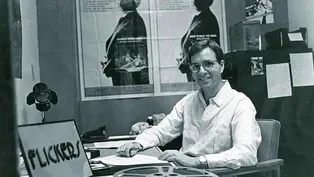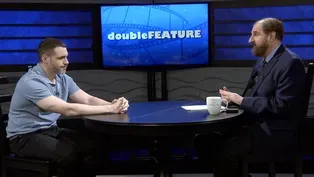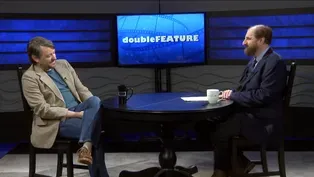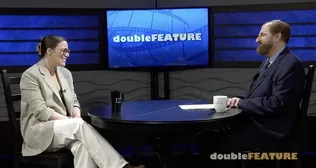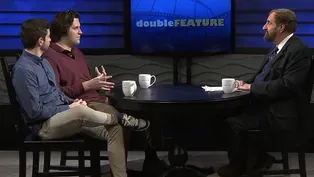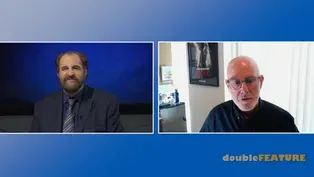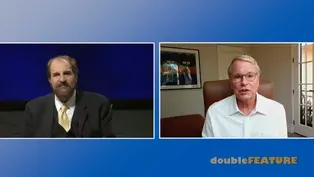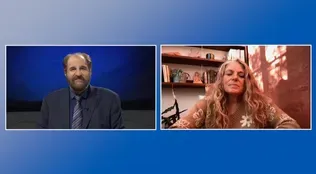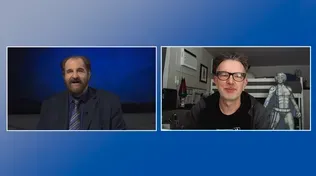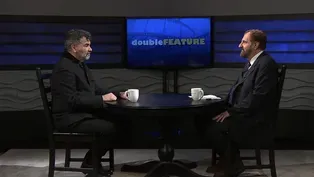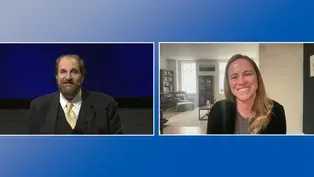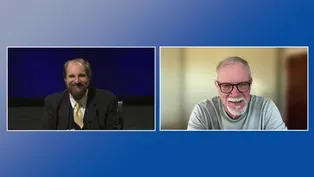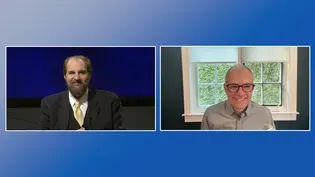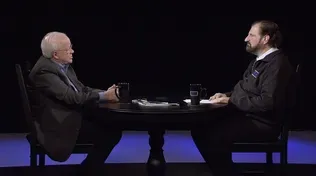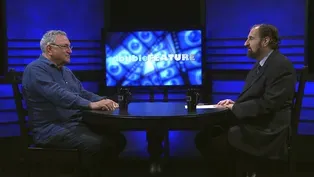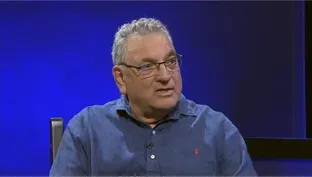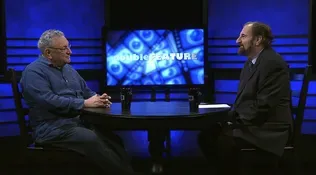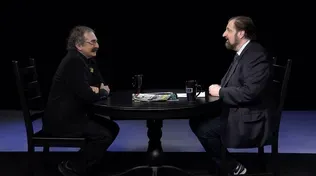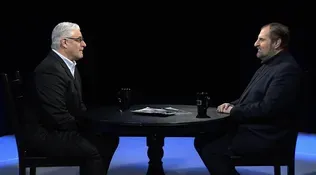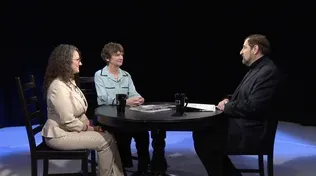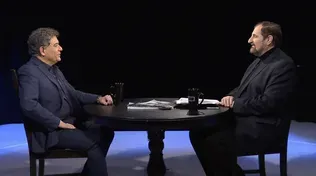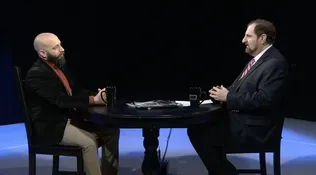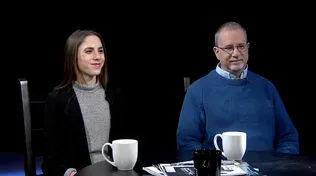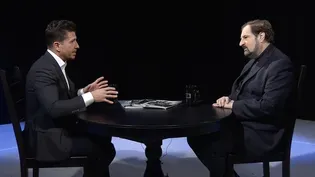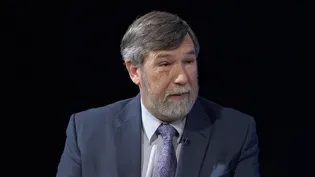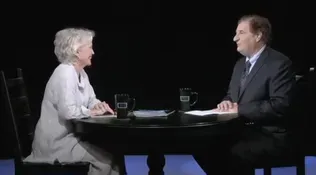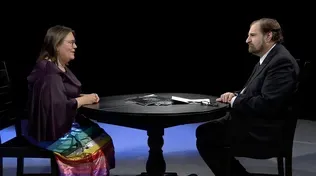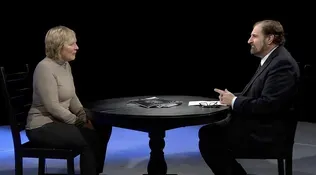
Interview with Adam McCarthy
Clip | 41m 15sVideo has Closed Captions
DoubleFeature shows films from around the world and takes viewers behind the scenes.
Steven Feinberg Executive Director of the RI Film and TV Office interviews producer Adam McCarthy, whose work includes "Cocaine Bear" and "Please Don't Destroy: The Treasure of Foggy Mountain."
Problems with Closed Captions? Closed Captioning Feedback
Problems with Closed Captions? Closed Captioning Feedback
doubleFEATURE is a local public television program presented by Rhode Island PBS

Interview with Adam McCarthy
Clip | 41m 15sVideo has Closed Captions
Steven Feinberg Executive Director of the RI Film and TV Office interviews producer Adam McCarthy, whose work includes "Cocaine Bear" and "Please Don't Destroy: The Treasure of Foggy Mountain."
Problems with Closed Captions? Closed Captioning Feedback
How to Watch doubleFEATURE
doubleFEATURE is available to stream on pbs.org and the free PBS App, available on iPhone, Apple TV, Android TV, Android smartphones, Amazon Fire TV, Amazon Fire Tablet, Roku, Samsung Smart TV, and Vizio.
(uplifting music) - Hi, I'm Steven Feinberg, Executive Director of the Rhode Island Film and Television Office.
Our guest tonight is from Jamestown, Rhode Island originally.
He now lives in Los Angeles.
I met him when he was working on the TV series Brotherhood as a location manager, and then he worked his way up and worked on productions like the Hunger Games, Fast & Furious, and now he's the Senior Vice President of Physical Production at Universal Studios.
Adam McCarthy, welcome to Double Feature.
- Thanks, Steven.
It's great to be here, man, old friend.
- I know.
I've been doing this job now for 20 years, Adam, and you were the location manager on Brotherhood, which was the first series filmed entirely in Rhode Island.
But I know you had a career ahead of that.
You were doing location work on the, I think the TV series, Providence, which that's the 25 year anniversary for, and that was like a few days in Rhode Island, right?
Location work?
But that all mostly took place in LA?
- Yeah, it was back in the day when, you know, series, even features, they'd come in and pop in for, you know, those iconic fall shots, College Hill, and then they'd escape back to LA, but you know, we'd get a little bit of work out of them.
It was, you know, prior to the incentive.
- [Steven] Right, right.
- And, you know, that changed everything, you know.
I mean, there were some smaller films that I did in Rhode Island prior to that, but they were local films, you know, Outside Providence, that kind of stuff, you know what I mean?
And so we were never going anywhere else for Providence.
- Right, right.
And I remember The Last Shot was another film you did here.
- Yep.
- And Outside Providence.
Yeah, and I think one of the things that, when I came back to Rhode Island in 2004, and I would have like these little town halls just to get a sense of the community.
And I remember folks saying to me, the TV show Providence was great for tourism, but none of us worked for more than a week.
And I took that to heart.
And then when you guys were scouting for Brotherhood, which was supposed to basically be a Massachusetts story, and then they were filming up in Toronto, we were able to bring it to Rhode Island because A, you showed Philip Noyce, the director, these great locations, and we had Steph Accetta who was on as a producer.
- [Adam] Yep.
- And I remember saying to Philip and the Henry Bronte, I said, you're going to, and they decided to make it a Rhode Island story.
I said, but you're gonna shoot three days in Rhode Island and the rest up in Toronto?
You're not gonna be telling the truth.
- That's a good point.
- Yep.
- I think when you took them to Twin Oaks, it changed everything.
- Right, right, right.
But I remember you in your car, you know, you always had stuff in your car to, you know, and maps and everything and you really did a phenomenal job of helping to raise the awareness of what Rhode Island had to offer.
- No, thank you.
Yeah, I mean, I think it's a funny story.
I mean, when I, my first job in Rhode Island was on a small movie Code of Ethics where Don Rattigan, they just asked me to be a location manager.
I had no idea what that meant.
So I kind of grew into it, you know what I mean?
From that point forward with Outside Providence, that jumped up to Me, Myself, and Irene.
But it was kind of trial by fire.
I just got thrown into it.
And again, being a Rhode Island native, locations is a little bit of a salesman thing, right?
You wanna make sure you're showing 'em the right stuff.
You wanna make sure that you're showing them stuff that's shootable.
As you know, it does no good to show them things that, that are impossible to shoot.
So, yeah, I mean, again, it's been a journey.
- You know, how did...
I never really asked you this, but what inspired you to get involved at all?
Did you want to do movies when you were younger?
What- - I mean listen, I grew up in a household that was very, like open to the arts.
I grew up in East Greenwich, right?
And I did, as a little kid, I was doing plays with the Academy plays, you know?
- Yep.
- Carousel, South Pacific, whatever.
And there were three movie theaters in East Greenwich at that time.
There was the- - The Odium, the Kent, the Odium, the Kent, and the Hilltop Drive-in, I think.
- Hilltop and Kent.
Yeah, and so spent a lot of hours in those movie theaters in the summer at the Hilltop, you know, in the back of a, you know, a wagon with my parents.
So it, you look back and you realize how, you know, impactful, that all was right?
And then you go off.
And I went to Henderson, and then I went to Boston University, and I got into, you know, sports and, you know, I went to communications, started the College of Communications at BU, where I took a lot of media courses, film courses.
And at some point I just said I wanna write.
And that's when I went out to LA early nineties after college to write.
I didn't gel with LA at that point.
And- - [Steven] I didn't know that.
I didn't know that.
- Yeah.
And then came back to Rhode Island after I was on the road with Coca-Cola doing a bunch of marketing stuff, which was fun.
But I was continuing to write during that time.
And that's when Don asked me to come location manage Code of Ethics.
And then I met, that's when Terecke with Strangers in Transit, soon after that was Outside Providence.
So, and he brought me in, you know what I mean?
And after Outside Providence is when I met Pete.
- Peter Farrelly, and Bobby Farrelly from- - Yeah, they were in town doing Something About Mary.
The first time I met them, they were premiering Kingpin.
And then I saw them on Something About Mary, and then they asked me to location, manage the Rhode Island portion of Me, Myself, and Irene.
- [Steven] Right.
- And if it wasn't, I saw Pete a couple weeks ago.
I told him again, I said, if it wasn't for you, I wouldn't be here.
You know what I mean?
- Did you work on Dumb and Dumber as well?
- No, that was before my time.
- Okay.
- Dumb and Dumber, Kingpin, then Something About Mary, and then it was Outside Providence.
So Outside Providence was my first Farrelly thing.
- Yep.
- And then I think I was, it feels like I was doing them for the next 10 years, you know what I mean?
And eventually they took me on the road to be Shallow Hal, Stuck on You and stuff like that.
So, yeah.
Without those guys, you know.
- And did you though, when you said you were writing, was your thought process to write and direct?
Is that what you were hoping to do?
- Yeah, I mean, I think that's the dream of a lot of people, right?
I mean, it's the thing that a lot of people dream of doing.
It's interesting.
I'm glad you bring that up, because I continued to write while I was location managing.
And then what I realized, you get older and you realize, oh, I'm good at this other stuff that people are actually paying me for.
And you have responsibilities and you have, you know, I have a wife and a 16-year-old daughter, and you realize, wow, you know, I'm making movies.
I'm at Universal, which is a dream.
I'm not writing and directing, but I'm doing everything I love.
You know what I mean?
So.
- [Steven] Right.
- It works out.
And I think that's the hard part for, you know, I could have stuck to the, I'm gonna write and direct or nothing.
- Right.
- I wouldn't be sitting here talking to you today.
Or maybe I would, who knows?
- I'm the same way, Adam.
I knew I was making movies as a kid, and I went out to LA knowing I was gonna make movies as a kid.
And I went to film school and wrote and directed and then I made a living as a writer.
And then I got an opportunity to come back home and start this whole industry and incentives.
And I think now I'm doing all this stuff.
I'm still making my own projects.
I'm still writing my own scripts.
I'm still developing and getting to interview you.
I came in today, I'm saying I get to interview a friend for a weekly series, and this is like totally cool.
And I get to, you know, explore your career.
And I look at your career, how you started, like when we met, and I never forget seeing you in your car.
And I think you might add like a Pepto-Bismol or antacid or whatever, and you're in your car.
- I probably had, I, you know, when Philip Noyce in the passenger seat, I probably had a couple of ulcers at that time.
- Yeah.
And it was cold too.
I think I saw you in you're freezing in the car, but you're doing your work and now you've made your way.
And I saw when you were doing the different movies where all of a sudden like 27 Dresses and you started to transition into production supervising and that kind of stuff.
And doing the Fast & Furious, and we'll get to all that, but the ride's amazing.
And everybody goes through their journey differently, right?
It's- - Absolutely.
And I think, you know, I do a lot of informational stuff with a lot of the younger people at the studio that are trying to figure it out.
And I think that's the hardest thing for a lot of people to accept, is that it's a journey.
There's no book.
- [Steven] Right.
- You can't go to school and say, this is how you're gonna be a line producer, a writer, a director, a studio exec.
And I mean, you just gotta find your way through it.
You know what I mean?
- [Steven] Right.
- It's a journey - And it's a lot of hard work.
It's a lot of passion.
It's making yourself useful.
It's being a really good team player and upbeat.
Right.
Reliable.
- I think what you try to do, and I think this would apply to any industry, right?
Is as you're coming up and as you become successful, if you wanna call it that, you wanna make yourself indispensable.
You need to kind of every day show your work.
You know what I mean?
'Cause that's what it's all about.
So I think, yeah, you're a hundred percent right.
- When we were doing a project, one of the big projects we did at the time, it was one of the biggest projects was Underdog for Walt Disney.
And we were doing that and that was a lot of work for you.
We did everything from doing an explosion at the State House.
The State House was a lot of work.
Basically we took the Armory and basically made it livable again.
That was a lot of work there.
Or I think we were doing any kind of lead removal, lead abatement.
- I think we actually ended up doing some support on the floor as well to make sure that it could handle the weight capacity.
- Yes.
- I mean the interesting part about that show was it was a heavy, heavy location.
We had the Army, which was amazing.
We had the cooperation, obviously with your help of- - The State House.
- The State House, but we were all over the city.
We were jumping off the Turks, I think it was the Turk's Head Building.
We did a huge- - [Steven] Yes, that was like the first night.
- Yeah, I mean, we were in every single alley, every single street.
And I think that was the first show in Rhode Island where I actually was able to put together a staff and really do it right, you know.
- We turned Providence, Rhode Island into Universal back lot.
- It felt like that.
I mean, honestly, now that I kinda live here on this lot, it kind of looks the same.
- Right.
- You know.
- I remember coming home after being in LA for 22 years and always saying that the Providence looks like a back lot of the studios.
And a lot of what we have to offer is, I say it's the smallest state with the greatest back lot.
I really believe that.
We have so much to offer here.
When you were working on after Underdog, which again, was a very heavy lift, and then you did, I think it was 27 Dresses.
Was that when you started to transition into UPM, unit production management?
- I'd have to really look back at the at the- - Time period.
- But the first supervisor job I had was with Pete and Bob on Fever Pitch.
So that was 2004, maybe Underdog was right around then?
- That was 2005.
Underdog was 2005.
- So then I did Underdog again, that was just at home too hard to...
I wouldn't have passed up anyway.
I mean, it was with Todd and Donna and everybody.
So that was a great movie to work on.
And then I think you're right, it was 27 Dresses, which I supervised.
- [Steven] Yeah.
- And that was the hard part is that's when you start to have to say no to some really good location jobs 'cause you wanna supervise.
- Right.
And we at that time, we were really going gangbusters here in Rhode Island.
We were one of the first states in the country to start an incentive program.
So a lot of productions wanted to come to Rhode Island for that.
And so you were in high demand.
Did you know that... Two things.
Did you have a mentor and was someone saying to you, "Hey, go from location management to production supervisor?"
- If I had a mentor, I would say that it was the producer I was working with the most, which is Mark Fisher, who was with the Farrellys.
I mean, I had done so much location work, and he was the first one to give me the job, give me the shot to supervise.
And then he continued to hire.
I supervised for them on another four or five movies.
So- - Like The Three Stooges?
- Yeah, Three Stooges, Hall Pass.
Again, we were outside of Rhode Island, but it always felt like we were trying to do a piece of something in Rhode Island.
- Right, right, right.
- But yeah, Fish was...
He was the guy for me, still is a super friend, still is doing stuff with Pete.
And, you know, it seems like it's that family that you know so well, that whole Farrelly group.
And so I'd say he was a mentor.
I'd say another kind of mentor was someone else I think you've had on the program, which is Jerry Ketcham.
- [Steven] Yes.
- Who was the exec on Underdog.
- [Steven] Yes.
- And also an exec on another one of my shows, The Proposal, that I supervised.
And he kind of, he gave me some really good advice along the way.
So- - He's terrific, right?
Tell us about production management, production supervising.
Tell us what that entails.
- Well, I mean, going from locations, the one thing that I had going for me is that I had already started doing budgets for my department, which can, at that point, I wanna say, you know, Underdog was somewhere around a million.
But you get to understand...
I couldn't have supervised without location manager.
Right?
So as a location manager, you're budgeting, you know, big/small movies, you are interacting with every single department.
You know, you're interacting with the production manager, with the line producer, with the grip, electric, camera, your dp, everything.
You know, it kind of, if you don't have a location, you don't shoot a movie.
Right?
I mean, everybody could say that about their department.
If you don't have a camera, you can't shoot.
If you don't have an actor.
If you show up in the morning and there's nowhere to shoot, that's a problem.
So having that familiarity with the entire crew, knowing how to budget to a certain extent.
I knew the crew.
So when I started to supervise, it was in Rhode Island, New England.
So supervising is about... Supervising is basically a non-union, UPM.
So you are meaning non-union, non VGA.
Getting into the DGAs, as you know, takes a lot of days.
I was already doing a big, it's a long story, but you're basically running the day-to-day work.
You're signing time cards, you're making sure you're hitting your days.
You're the right hand for the line producer.
And so, and then you start to have relationships with studio folks like Jerry.
- So you ended up doing what production supervising or producing?
- What happened is, like, again, with the Farrellys.
So basically if I can tell a quick Jerry, another Jerry Ketcham story.
- Sure.
- So I was out here actually budgeting Dumb and Dumber too well before it got made, right?
Like it was a process.
So I was out here... We thought we were gonna get into it and make it.
I was budgeting with Fisher, and I had lunch with Jerry and I said, "Jerry, when are we gonna do another one of those 27 Dresses and The Proposal?"
Or like, those were like, it was a reasonable amount of money to make a movie in a very civil way.
And we know that that's not exactly how it always goes down.
- [Steven] Right.
- And at that point, he's like, "Listen, I'm looking at our slate and we're really, those aren't the movies we're looking to make.
We're making Pirates Six, John Carter from Mars".
or whatever, you know what I mean?
Like really big sequel type franchise type movies based on - - Epic.
- Yeah, yeah.
And so he said, "If I have any advice for you at this point, I mean, you get a pretty good resume now, but you need to get a tentpole."
And what he meant by that was this.
There were things that I didn't have in my toolbox.
Right?
A major stunt show, major effects, major visual effects.
And so- - And for the audience, just for the audience, a tentpole would be a big summer blockbuster potential movie that's a tentpole.
To bring everyone under the tent so that it's a wide audience.
And that's why they call it a tentpole.
Go ahead.
- Yeah, it's big for us.
It's the Jurassic and the Fasts and that kinda stuff.
So it was just a coincidence at that point that I got a call from the producers of the Hunger Games to go in and interview with them to supervise the second one, Catching Fire.
And they hired me.
And that kind of was my first big, you know, big move.
- How much money, do you remember what the budget was on that?
- It was, honestly, it was Lionsgate at that time.
You couldn't spend a lot of money at Lionsgate.
I think we probably, I can't remember, but I'd say it was, it's over a hundred, under 150.
You know what I mean?
- Right, right.
- And the movie did really well.
- [Steven] Yep.
- And then- - Did you, Adam... Do you remember how many days of shooting on a size of that production?
Like how many days?
- What's interesting about those shows is it's a combo, right?
Because, so you're gonna have probably... We probably did 70 days of main unit, probably another 20 days of second unit, which is all very reasonable.
- Yep.
- I mean, that was a tight show, you know what I mean?
We had a director who was really like, responsible and hands-on and super.
It was just a good show to work on to finish that up.
And then I think my next one after that was Fast 7.
- [Steven] Yeah, yeah.
And where did you film Fast 7?
- The Fast 7 based out of Atlanta.
That's the movie where we dropped the cars out of the C130, so then we shot in Tights Peak.
- [Steven] Wow.
- And then, and I mean, that was basically it 'cause that was the main sequence in the, oh, and then we went to Abu Dhabi.
I'm sorry.
So yeah, the Fast movies are a little bit of a travel journey.
You know, you hop around.
- Yeah.
- Because you got it after.
I think that was seven.
So you've hit a lot of... You've kind of run out some territory by that point.
And you know, and we're still doing 'em, so you gotta find new places to shoot.
- Can I ask you, when you're going to a place like Abu Dhabi, are you talking to someone else who's filmed there?
How does that happen?
- I mean, I think the first stop with them was their film office.
And they were very aggressive.
I mean, the Emirates is a place that is built on oil, right?
So they're very interested in other ways to generate business.
And so they were very aggressive.
So we start there.
Then, you know, you start there were some production services companies there.
You bring them on, they start to consult and put together some numbers and find a location person to find.
I mean, it wasn't, a lot of days.
It was driving in the desert, and there was a car that we did a triple, so there's three skyscrapers there.
The car went from the penthouse, jumped into the next one, jumped into the next one, and then went out the window.
So- - [Steven] Which is a typical day in Abu Dhabi.
- [Adam] That's it, that's what happens all the time.
- Right, right.
Are you having to bring your crew in?
Or do they have a crew there?
- The thing is this, on a show like that, or even to show like The Fall Guy, which I just finished, which is a heavy, heavy stunt show.
- [Steven] Yeah.
- There's a lot of specialty technicians.
You're bringing a lot.
Listen, if you can find them, you hire.
- Right.
- If you can't, you bring 'em.
- Right.
- And so it's always a little bit of a give and take.
You know, there's a balance.
And so again, if I shoot somewhere and I could hire all local, I'd do it all day long.
But sometimes those people just don't exist for obvious reasons, you know?
- Right, right.
- So we've brought a fair share on that movie for sure.
- Are you- - And Pikes Peak was probably a crew of... Look at that sequence, that was probably a crew of 200 for three weeks in Colorado.
- Wow.
- Yeah.
- Are there particular moments where you're stressed out when you're doing a production of that size?
Or do you feel like- - I mean, there's always those moments.
I would say, like after this many years, I know how to kind of...
I know it's gonna get done.
It might be hard, but it's always, we're gonna figure it out.
I'd say that on that one.
That was when Paul died on Fast 7.
So that was a pretty tough moment of whether you, you know, you know you're gonna finish the movie or not.
You have 500 people that you meet with the weekend after Thanksgiving and say, we're gonna try to get back on our feet, but you gotta give us a beat.
And so that was hard.
- Yeah, let me ask you this.
You know, the James Bond films really have been always trying to do stuff on a practical level, and that was kind of their, what they're known for is we're doing this for real.
- Yeah.
- And they might augment some stuff, but it's not, they're doing the real stunts and everything.
And having talked to Jerry about this also, are you finding that there's more CGI work done rather than some of the practical stunts and effects and how- - I mean, I think we always do as much real as we can and let visual effects and CGI kind of enhance, take over that kind of stuff.
Safety is a huge issue.
And you always have to be, I mean, look at The Mission Impossible.
- [Steven] Right.
- They start, they stop, they start, they stop.
Nevermind it being an inefficient way of doing it.
But you gotta do things right.
And you gotta always be thinking about safety, - Right.
- So I'd say you try to do as much as you can in a safe environment where everybody feels okay about it.
Again, it's the people you hire.
You hire responsible, smart people who aren't gonna take those chances, those silly chances.
You know what I mean?
I mean, they're making movies.
- Right, right.
You don't wanna endanger someone's life.
Lemme ask you this, how did you get from the transition from production supervisor and then this kid from Jamestown, Rhode Island, East Greenwich, Rhode Island, walks through the door now as a Senior Vice President of Physical Production and Universal Studios.
I gotta... How did that all happen?
I'm excited to hear it.
- It's, well, again, it all kind of, just one thing runs into the next, right?
So, going back, this is weird.
You go back to Hunger Games, the person that gave the Hunger Games producers my name was a guy named Jeff Laplant.
- [Steven] Jeff Laplant.
- Who I had never worked for.
- [Steven] Jeff is from Massachusetts, right?
- No, Jeff's an LA guy.
- Okay.
- But, so Jeff gave my name to them because there were a few movies along the way while I was with the Farrellys.
And they asked me to work on Fast 5 another producer, a guy named Mike Fottrell was producing Fast 5.
He asked me to do that.
I was luckily busy, right?
It is a good problem to have in our business.
So I was doing Fast 5.
I'm again, I'm not the guy to bounce from show to show without finishing it.
You know what I mean?
I just don't do that.
Never did.
Then he asked me to do both...
This is a Universal show.
And then he asked me to do RIPD.
- Which we shot some of that in Providence I remember the chase- - I think they did.
There's definitely some place in Providence, they did some stunts, but mostly Boston, right?
- Right, right.
I remember that.
Yes.
- And the reason why I don't know, really is because I didn't do it.
But again, it was a Universal show that I said no to.
So when Hunger Games asked Jeff, "Do you have any ideas?"
And he just kind of said, well, there's this guy that we keep on trying to, I don't know him, but he keeps on.
He's busy, so he must be all right.
You know what I mean?
So that was Jeff.
So after that, like I said, after Hunger Games, my first Universal show was Fast 7.
- [Steven] Oh yeah.
- Right.
And kind of the only show.
So on Fast 7, obviously that was two years of my life.
And again, out of a very tragic situation, I became almost part of the Universal family.
I was brought into, I came out to LA when we were trying to figure out how to reboot it, how to get it back up.
I was involved in meetings.
I had no business being in, you know what I mean?
Like, I was with the head of the studio at the time with people within the studio that I didn't understand that these things existed.
You know, a post department, visual effects, music, marketing, all these people, like all of it.
So it was really like a, you know, wow moment.
And so that was, again, that was another...
I was probably in the movie for another year after that, but I had been introduced to all these people here.
- Yep.
- I then went out and did a movie called Central Intelligence in 2015, '14/'15.
- [Steven] That was in Boston, right?
- Yep.
I mean, again, I'm in Rhode Island, this whole....
I'm based outta Rhode Island this whole time.
- Right.
- I mean, I had bought my folks' house in East Greenwich at that point.
So I was my wife, my daughter was seven at that point.
So like, it was life, you know?
- Right.
- And so at that point, Jeff got promoted to president of production.
I'm in Boston.
And he kind of calls me and says, "Do you want...
There's a spot at the studio?
Do you want to come out and do it?
Have it?"
And I said, I was really resistant at first.
- Life changing.
That's a big life change.
You've got a family.
- And I think back and I'm like, it was even more life changing than I thought it was gonna be.
You know?
So I was resistant.
I liked my life.
I was producing movies at this point, but I wanted to produce bigger movies, 200 plus type movies.
And I know, I thought back to those meetings I had in LA with the studio during Fast.
And I said, if these people are ever gonna trust me, my plan was to come in here for a couple years and get out.
If these people are gonna trust me with 200 million, they should probably know what I'm like.
You know what I mean?
- Right, right.
- They should know my face.
- Right.
- Anyway, cut to, you know, I finally said yes.
Brought my family out.
In the end, tough at the beginning, a super move.
I mean, I love it here.
I'm with my family almost every day.
Still traveling a lot, but not like six months at a time, two years at a time, that kind of stuff.
You know what I mean?
- Right, right.
- It's been great.
- And you're not like living outta your car during the days and having- - No, I still live outta my car.
I couldn't get rid of that...
I like that so much that I still- - You still do it.
Like, after this meeting or after our interview, you're gonna go down your car and just kinda- - Take a nap.
- Yeah, take a nap.
Have some Cheetos with you.
- No, I'm still dealing with LA traffic, so it's gonna be an hour to get home, but it's still, I get home.
I still have dinner with my wife and daughter.
- Right.
So let me ask you, now that you're at the Universal Pictures and you're supervising these various productions, what's a typical week?
Are you guys having meetings with the various what's in development?
What are we doing?
Is there?
- So that's a good question.
I mean, it's kind of, the short and long of it is like, I do a lot of work that never gets seen because I just budget come up with production plans for shows that never see the light of day.
Sometimes there's a project that comes on where it's, we know we're gonna make it, and it's ready to budget, it's ready to hire people, it's ready to put a production plan in place, and you just go hard.
You know?
And so it's kind of like, there's some days and it's cyclical.
If I, you know, some, you know, there's a chunk of time where that's all I'm doing, and I'm not running a show.
And then there'll be another time where you oversee a couple of small shows and a big one, and it's really nonstop.
And with those big ones, there can be a lot of travel and there's a lot of moving parts and it takes a lot of time, you know, so on Twisters, I was in Oklahoma a lot, and that was a big, big show.
- [Steven] This is the sequel to Michael Crichton's Twister, right?
- [Adam] Yes.
- [Steven] Is this Amblin or not Amblin?
- This is us.
And you know, I mean, you know, Frank Marshall's a producer on it.
- Okay.
- You know, it's that team.
You know what I mean?
- Right, I know that they were on the original.
- Yeah.
- And I think the original was what Jan de Bont, I think was the director.
- Sure was.
- Who was the director on this one?
- A guy named Isaac Chung.
- Okay.
- Who is, he had done us a movie called, if you haven't seen Manari.
- No.
- It's a kind of a story of his life, his family moving here, I think from Korea and just a really small movie.
Like, just a really thoughtful, smart dude.
I like just a really great guy handpicked from the team.
You know, he went to, you know, they found him and they loved him and he did...
The movie's fantastic.
- So let me ask you something.
Having sold like a script to a studio a few times, so let's say 30 scripts are purchased by Universal in a year.
Is that a fair amount maybe?
Or is it- - Do you know what that happens in the other suite?
- Okay, so- - I don't know exactly how many.
- Let's say 50.
I don't think it's that many.
Let's say 50 scripts have been purchased a year, and then they go through the creative process, rewrites, et cetera, see who's attached, possibly.
And they say, okay, these are now the 10 we're looking at.
We know we wanna do the next Fast & Furious.
That's already, that's locked in.
And I think you guys are doing Universal Monsters again, or working maybe with, I don't Blumhouse, I'm not sure.
Do you deal with Blumhouse or not?
- Yeah, we work with Blumhouse.
Like, the execs sitting here will oversee a certain amount of Blumhouse movies every year.
- Yep.
- So, yeah, I mean, they have their head of production.
We kind of just make sure that things are staying on track.
- [Steven] Okay.
- So it's kind of, it's a partnership there, you know what I mean?
- Yep.
So let's say like you have a production like Twisters and you said that was in Oklahoma, and then you have an another production here.
Are you doing like what Jerry does and say, hey, there's an incentive, like for example, in Rhode Island?
You know, let's call it the most beautiful woman in the world.
Well, you obviously know, you've gotta think of Rhode Island for that.
Does Rhode Island have an incentive?
Yes.
Okay, where else are we thinking?
So that's what, is that part of what you're doing?
And then you- - Not just part - That's it, huh?
That's a big piece.
- It's not it.
I mean, like, the thing is it's not black and white.
Right?
So there's the creative part of it.
- [Steven] Yep.
- Take Twisters.
They shot the first Twisters in Oklahoma.
- [Steven] Yep.
- Isaac is from Arkansas.
There's kind of a reason to go back to Oklahoma, which has an incentive.
- [Steven] Yep.
- So you gotta weigh it all out, you know what I mean?
Like, we had The Fall Guy beginning like it bounced around the world until we ended up in Sydney, Australia.
Which I mean, it's not just incentive, it's also currency.
- Right.
- What else can we do that may be even better, but cooler and spend a little less money so we can sit, I mean, everybody that makes a movie, for the most part, it's a relationship with Universal or a studio that puts movies in theaters.
- Right.
- That's a whole other conversation, right?
I mean, we have Peacock, there's a streaming side of this whole thing, but the reason I got into this business and I feel supported here is because we put movies in the theaters and that's an experience, right?
- Yes.
- So people wanna be here.
- Right.
- You know, whether you are Chris Nolan on Oppenheimer or David Leitch on Fall Guy, or Isaac Chung on Twister, you feel supported here.
So, you know, it's a partnership and there's a mutual thing that goes on where you wanna, because it is a business, right?
You wanna do what you wanna do- - The best.
You wanna maximize the potential.
- The best with what's been given to you.
- Well, Adam, unfortunately we're out of time.
I could talk to you all day, but I am so proud of you.
I'm so happy for you.
You look fantastic.
I'm so glad that you're thriving.
You're doing what you love.
I hope we see more of you here in Rhode Island, or I get an opportunity to see you in LA, but I couldn't be more grateful to have you take time out of that crazy schedule you have.
- Listen.
It's my pleasure.
And it's, we, you know, we go way back and it's awesome to see what you've done there with the shows that keep on coming in, whether it's The Gilded Age or whatever, you know what I mean?
Like, you keep it going.
And so, I mean, you're a Rhode Island icon now, whether you like it or not.
- Thank you.
Thank you Adam.
And you are an icon and you're a legend.
And- - In my own brain, I think.
- No, no, no.
I'm gonna tell you something.
I used to ask you a lot of questions because you had a lot of experience, and you taught me quite a bit.
And you were very always were savvy about the industry and people, and you always carried yourself well, and you continue to do so.
And thank you so much.
And I look forward to talking offline, bud.
- For sure.
I'll let you know when I'm back.
- Okay, thanks.
Stay healthy and happy.
- You too, bud.
(upbeat music)
The Legacy of George T. Marshall
Video has Closed Captions
Clip | 44m 58s | Remembering the founder of Flickers, George T. Marshall. (44m 58s)
Video has Closed Captions
Clip | 44m 59s | Steven Feinberg interviews director, writer, and actor, Tom DeNucci. (44m 59s)
Video has Closed Captions
Clip | 45m 2s | Interview with Alex Berard. (45m 2s)
Video has Closed Captions
Clip | 44m 59s | Steven Feinberg interviews First AD, Emma Barber. (44m 59s)
Interview with Chad Verdi Jr. and Paul Luba
Video has Closed Captions
Clip | 45m 31s | DoubleFeature shows films from around the world and takes viewers behind the scenes. (45m 31s)
Video has Closed Captions
Clip | 41m 15s | DoubleFeature shows films from around the world and takes viewers behind the scenes. (41m 15s)
Interview with Angela Peri and Lisa Lobel
Video has Closed Captions
Clip | 45m 25s | Interview with Angela Peri and Lisa Lobel (45m 25s)
Video has Closed Captions
Clip | 45m 45s | Interview with Jerry Ketchem. (45m 45s)
Video has Closed Captions
Clip | 49m 15s | Steven Feinberg interviews award-winning filmmaker, Elyse Katz. (49m 15s)
Video has Closed Captions
Clip | 44m 30s | Steven Feinberg interviews storyboard artist, Martin L. Mercer. (44m 30s)
Video has Closed Captions
Clip | 45m 19s | Steven Feinberg interviews Providence Pictures' Gary Glassman. (45m 19s)
Video has Closed Captions
Clip | 40m 24s | Steven Feinberg interviews producer Erika Hampson. (40m 24s)
Video has Closed Captions
Clip | 41m 56s | Steven Feinberg interviews directer/producer Joe Johnston. (41m 56s)
Video has Closed Captions
Clip | 45m 29s | Steven Feinberg interviews producer David Crockett. (45m 29s)
Video has Closed Captions
Clip | 42m 44s | Steven Feinberg sits down to interview the late film director, Douglas Trumbull. (42m 44s)
Henry Bronchtein Interview Pt. 3
Video has Closed Captions
Clip | 15m 25s | Steven Feinberg interviews director, producer, and production manager Henry Bronchtein. (15m 25s)
Henry Bronchtein Interview Pt. 2
Video has Closed Captions
Clip | 14m 51s | Steven Feinberg interviews director, producer, and production manager Henry Bronchtein. (14m 51s)
Henry Bronchtein Interview Pt. 1
Video has Closed Captions
Clip | 15m 33s | Steven Feinberg interviews director, producer, and production manager Henry Bronchtein. (15m 33s)
Video has Closed Captions
Clip | 37m 9s | Steven Feinberg sits down to interview producer and writer, Roger Lyons. (37m 9s)
Video has Closed Captions
Clip | 27m 31s | Steven Feinberg sits down to interview filmmaker Dante Bellini. (27m 31s)
Katie Reaves and Jennifer Jolicoeur Interview
Video has Closed Captions
Clip | 27m 7s | Interview with filmmaker Katie Reaves & Athena’s Home Novelties Pres. Jennifer Jolicoeur. (27m 7s)
Dr. Thomas Zorabedian Interview
Video has Closed Captions
Clip | 27m 6s | Steven Feinberg interviews professor and video producer/writer, Dr. Thomas Zorabedian. (27m 6s)
Video has Closed Captions
Clip | 26m 47s | Steven Feinberg sits down to interview picture editor Rob Schulbaum. (26m 47s)
Ron Bachman and Devin Karambelas Interview
Video has Closed Captions
Clip | 26m 45s | Steven Feinberg interviews Ron Bachman and Devin Karambelas from WGBH in Boston. (26m 45s)
Video has Closed Captions
Clip | 26m 15s | Steven Feinberg sits down to interview filmmaker Eric Latek. (26m 15s)
Video has Closed Captions
Clip | 26m 51s | Steven Feinberg sits down to interview host of Conducting Conversations, Mike Maino. (26m 51s)
Video has Closed Captions
Clip | 6m 34s | Steven Feinberg sits down to interview actress, producer, and screenwriter Marlyn Mason. (6m 34s)
Melissa Tantaquidgeon Zobel Interview
Video has Closed Captions
Clip | 16m 5s | Steven Feinberg sits down to interview author Melissa Tantaquidgeon Zobel. (16m 5s)
Video has Closed Captions
Clip | 26m 51s | Steven Feinberg sits down to interview director Alexia Kosmidor. (26m 51s)
Providing Support for PBS.org
Learn Moreabout PBS online sponsorshipSupport for PBS provided by:
doubleFEATURE is a local public television program presented by Rhode Island PBS
